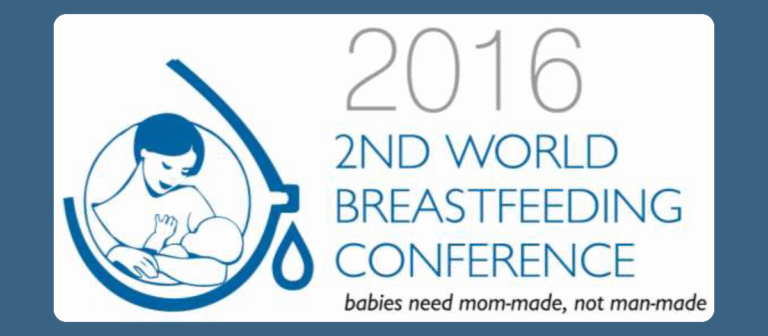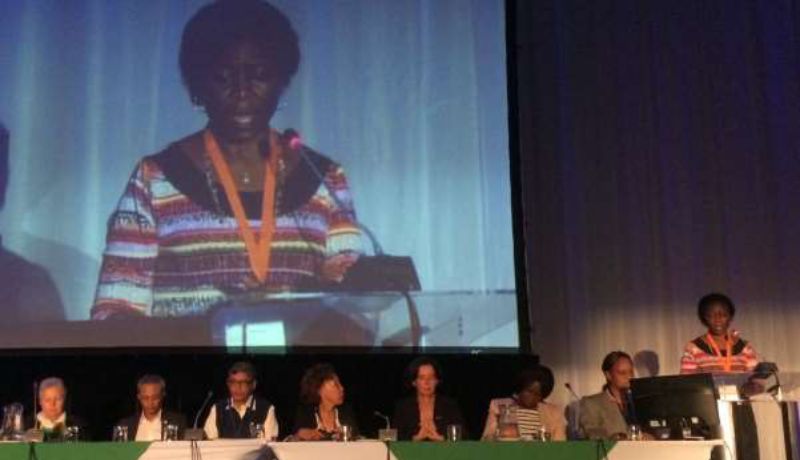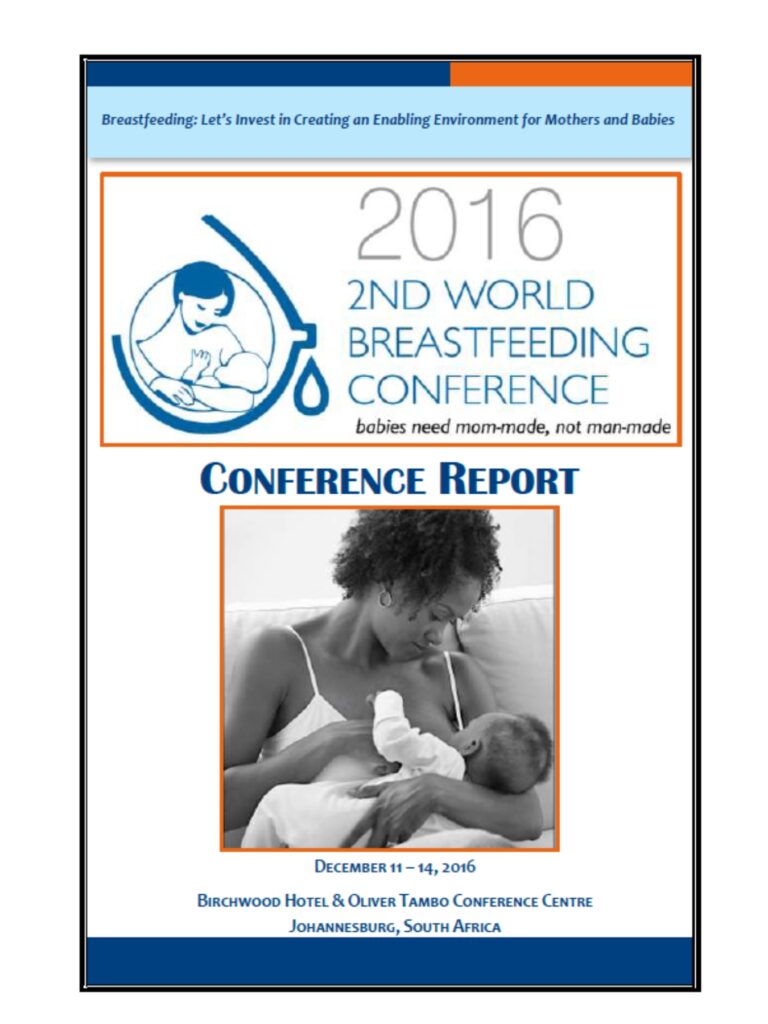2nd World Breastfeeding Conference
"Babies need mom-made, not man-made"
December 11th to 14th, 2016 | Johannesburg, South Africa

About the Conference:
Global trends in exclusive breastfeeding rates in some regions are stagnating or even declining, while sales figures of infant formula and other baby foods are increasing annually. Available evidence indicates that violations of the International Code of Marketing of Breastmilk Substitutes, relevant World Health Assembly (WHA) resolutions but also national laws on the Code are continuing as baby food companies have continued to aggressively market their products against very under-funded national monitoring efforts. Sub-optimal breastfeeding practices contribute to 13% of all deaths among under-five children in the developing world as well as to the high prevalence of malnutrition, which continues to be a major public health challenge especially in Africa1 as well as Asia.
Several cost-effective interventions for improving the health of mothers and their children have been identified by The Lancet series on Maternal, Neonatal and Child Survival2. Five of the ten most cost-effective interventions for helping the poor have been shown to be related to nutrition3 by the 2008 round of the Copenhagen Consensus. Despite this evidence, nutrition programs remain chronically under-funded, the scarce resources are often not allocated to where they will have the biggest impact and are inefficiently spent with inadequate balance between spending on curative care and promotional care. There is thus need for increased financial and political commitments as well as compelling member states to invest in improving maternal, infant and young child nutrition in order to facilitate the move towards attainment of the 65th WHA 2012 targets by 2025. The need to invest in MIYCN is even more crucial now as the global community has ended the MDG era and has agreed on a new framework, the Sustainable Development Goals (SDGs).
It is against this background that the International Baby Food Action Network (IBFAN) in partnership with the Department of Health, Government of Republic of South Africa, proudly hosted the Second World Breastfeeding Conference with the theme Breastfeeding: Let’s Invest in Creating an Enabling Environment for Mothers and Babies. The conference was held from the 11th to 14th December, 2016 at the Birchwood Hotel and Oliver Tambo Conference Center in Johannesburg, South Africa.
IBFAN AFRICA
IBFAN’s 2nd World Breastfeeding Conference
Call to Action
Johannesburg, South Africa
December 11th to 14th, 2016
The theme for the 2nd World Breastfeeding Conference ‘Let’s invest in Creating an Enabling Environment for Mothers and Babies’ builds on the 1st World Breastfeeding Conference “Babies need mom-made NOT man-made”. This Breastfeeding Conference hosted in Africa, reflected on the progress made globally, regionally and at country-level on policies and programmes to improve breastfeeding.
Today, our world is threatened by multiplied armed conflicts increasing violence, climate change, forced migrations, deepening social inequalities, and increased greed of corporations. Enabling mothers to exercise their right to give birth and breastfeed as they wish and need undoubtedly contributes foster more equal societies, prevent violence and a more suitable use of natural resources, contributing to the preservation the life on the planet. Every breastfeeding mother are important actors for change.
The Special Rapporteurs on the Right to Food and the Right to Health (November, 2016). Made the call for the recognition of breastfeeding is a human right. Taking note of public health importance of breastfeeding and the need for multi-sectoral coordination, we recognize the need to heighten efforts to advocate and sensitize all levels of society, starting with mothers and their families with accelerate efforts to build political commitment at all levels but especially at the community level in making breastfeeding the social norm.
Deeply concerned with fragmented and weak implementation of breastfeeding policies and programmes in countries which undermine the efforts being undertaken by the national governments. We are concerned that implementation and lack of understanding at an individual and community level of International Code of Marketing of Breast milk substitutes is far from satisfactory, leading to unrestricted promotional activities of the baby food manufactures.
Acknowledging that the updated guidance on infant feeding in the context of HIV for the first time harmonises the breastfeeding recommendations for women with HIV and the general population and specifically recommends counselling and support, provides an excellent opportunity to revitalise the protection, promotion and support for breastfeeding with a unified message. At the same time, availability of ARTs and support for adherence and retention for breastfeeding women living with HIV is pivotal.
Emergencies whether man-made or natural are becoming a growing concern globally. Noting that the recent WBTi report (2016) documents that attention to infant and young child feeding in emergencies is adequate, it is important that all countries and implementers should become better aware of the Operational Guidance on Infant feeding in emergencies, build capacity related to it for emergency preparedness, response and mitigation.
We the participants of the 2nd World Breastfeeding Conference 2016 call upon all concerned to take action and prioritize the following:
-
Implement a national coordination mechanism to deliver effective Breastfeeding and infant and young children feeding plans through engagement with other sectors outside of health, especially involving mothers.
-
Develop legal framework that enables mother’ to breastfeed their infants wherever and whenever.
-
Develop and strengthen implementation of guidelines and tools that protect policy and programme setting, as well as research from undue commercial influence to avoid and manage conflicts of interest.
-
Create child and women friendly workspaces and strengthen systems to support working mothers and mothers returning to work or adolescent mothers returning to school.
-
Explore country level feasibility of establishing human milk banks as an intervention to reduce morbidity and mortality among neonates and reduce reliance on breast milk substitutes, especially in circumstances where women are unable to breastfeed.
-
Establish regular publically funded monitoring systems and research providing feedback on evaluation in breastfeeding and infant and young child feeding implementation, free of conflict of interests.
-
Advocate for increase budgetary allocations at national level to ensure sustained efforts, based on costing analyses on breastfeeding promotion, protection and support.
-
Allocate specific resources for breastfeeding and infant and young child feeding including maternity protection for the next 5 to 10 years to make meaningful impact on early childhood nutrition and development.
-
Raise awareness and ensure the involvement of communities in the monitoring of the Code in line with the subsequent WHO resolutions and guidance on inappropriate marketing of Breast milk substitutes.
-
Ensure that all settings where mothers and young children are cared for apply the principles of Mother-Baby Friendly practices, encouraging the involvement of fathers.
-
Create demand for breastfeeding support through clear communication and social behaviour change strategies, which include the voices of mothers and communities and extend breastfeeding capacity beyond the health system.
-
Implement policies and programmes that provide the use of safe feeding options that protect and support mothers and children in special circumstance, including HIV and emergencies.2



